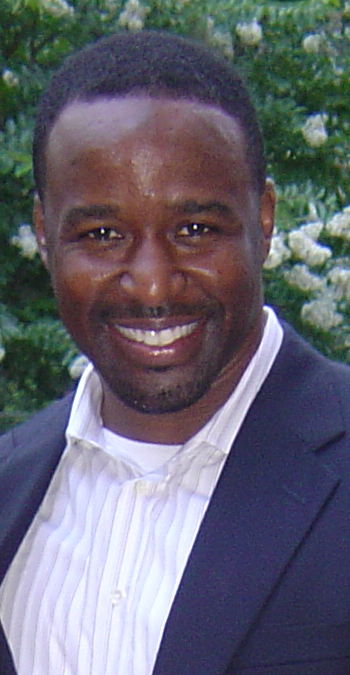How Jerry Lawson Learned to Stop Worrying and Love the iPad
As somewhat of an unsung hero in technology, it’s understandable that Gerald “Jerry” Lawson — responsible for building the Fairchild Channel F, the first cartridge-based video game system — developed a sharp, tough persona.
“He was pretty critical, to say the least,” says his son, Marc Lawson, a senior product developer for NBA Digital.
As an original member of the legendary Homebrew Computer Club in the 1970s, Jerry Lawson rubbed elbows with Steve Jobs and Steve Wozniak in their early days. But unlike the rest of the computing world, he wasn’t an adoring fan.
“I was not impressed with them — either one, in fact,” Jerry said in a 2009 interview with Vintage Computing and Gaming. “I interviewed Steve Wozniak for a job to work for us [at Fairchild]. Well, my guys were kind of impressed with him at first, and I said I wasn't. Never had been.”
Jerry’s coolness for the Steves carried over to many of Apple’s early inventions, although Marc says he had an Apple IIe at home.
Perhaps part of Jerry’s aversion to Apple products had to do with his interest in devices that allowed him to customize and tweak the technology, as opposed to a slick, closed-system product, his son says.
Marc and his father carried on this debate about Apple’s products for years, but before Jerry died last year at the age of 70 from complications related to diabetes, he admitted to his son that Apple did a “good job” with the iPad.
“It's funny that in the end, he admitted to me that they did a really good job with this iPad. And it made me laugh. I was like, ‘WHAT?!’” Marc says. “I think his thing was that it was a well-thought-out product. It allows people to get things done without having to worry about the hardware underneath.”
“I think that early on, because he was an engineer, he was more of a command-line, UNIX type of person. So all the other stuff didn't matter to him,” Marc adds.
It’s been more than a year since his father passed last April, but it’s precisely this cutting brand of criticism and discernment that he misses most about his father. His father didn’t mind shooting from the hip, and he was good at pressing Marc to think about different angles to problems that he might not have considered on his own.
A Legacy of Knowledge
Jerry Lawson was a rare breed as a black engineer and technology inventor. BizTech magazine recently honored Lawson’s achievements as a Father of Technology, and he had the respect of his friend and colleague Allan Alcorn, Pong creator and innovator at Atari, who referred to Jerry as a “pioneer.”
But because the video game system he invented was quickly overshadowed by the Atari 2600, Lawson is often overlooked in video game history.
Fame or no fame, Jerry’s love for invention, exploration and technology was something that he worked hard to instill in his children, Marc and Karen. Introducing young children to technology was an underutilized gift that his father had, Marc says.
“A lot of times he would [evangelize technology] by showing people, especially small children,” he says. “That's kind of something he was extremely good at, and I don't even know if he was aware of it.”
In his later years, Jerry worked with a program at Stanford, where he mentored engineering students, Marc says. But Jerry’s attempts to get people, particularly minorities, excited about technology sometimes fell on deaf ears. He found that people often preferred to play with their technology rather than bother with understanding how the pieces worked together.
“He used to be amazed that more people weren't interested in how things worked,just playing the game, I guess to an annoyance,” Marc says.
With black founders making up only 1 percent of venture-backed startup companies, according to CB Insight’s Venture Captial Human Capital report, it’s clear that garnering interest in technology among blacks and other minorities will be key to building a more racially diverse tech industry.
Hardware Father vs. Software Son

Marc Lawson
Although most people appreciate Jerry Lawson for liberating video game software from its console, he actually was far more in love with hardware, his son says.
Marc, on the other hand, is the opposite. After getting his bachelor’s in computer science at Morehouse College, Marc went on to pursue a master’s in human computer interaction at the Georgia Institute of Technology. Now 39 years old, he works as a senior product developer with NBA Digital, a joint venture between Turner Sports and the NBA, where he works on applications. One of note is the popular Game Time mobile app, which sends basketball fans scores and highlights from NBA games.
Marc’s love of software goes all the way back to childhood, he says. When he was 8, he and his cousin would program games in BASIC. But Marc’s software background gave him a viewpoint different from his father’s, who had an electronics engineering background.
“He came from an era of punch cards and assembly language programming, whereas I come from a world of C and Java and Objective-C, which is using libraries that actually talk to the hardware,” Marc says.
“He would comment that ‘you guys don't really know what it is you're developing on.’ It's black box to us. We'll write code without even understanding the architecture of the underlying hardware and what we can really do with it, because programming is abstracted.”
Although they clashed at times on the importance of hardware versus software, Jerry’s dedication to hardware rubbed off on Marc in the end. He has dabbled a bit into the hardware side of things, and he’s found that it helps inform his software development in innovative ways.
Remembering Jerry Lawson
Before he passed, Jerry Lawson was concerned with leaving his story behind. In his 2009 interview with Vintage Computing and Gaming, Jerry mentioned that Marc had nominated him as a fellow at the Computer History Museum, which he thought was an important step for encouraging future generations of black engineers and technologists.
“I'm writing my story because I think that when kids go there — black kids — and they see somebody black, it will make a big difference on them,” he said.
But the nomination didn’t pan out, Marc says. His father’s health began to fail, so he didn’t get around to writing his own biography. In the future, Marc hopes to work with a writer to put his father’s story into words, but he’s had his hands full with his newborn son.
Shortly after his father passed, Marc found out that his wife was expecting. His son was born in April this year, the same month that his father passed.
While Jerry Lawson could be a stickler when it came to engineering and technology, he often derived pleasure from the simple quirks of his field. Marc recalls that his father would get a kick out of a bug that he and his sister would exploit in the Channel F game “Maze.”
The game, which consisted of one cursor (the cat) chasing the other cursor (the mouse), would go crazy and get stuck if the player moved to a certain area of the maze, he says.
“It'd just be stuck in that pattern, and we used to call it ‘making the cat sick,’” Marc says. “We used to be amazed at how that would happen, and we would all just laugh.”







